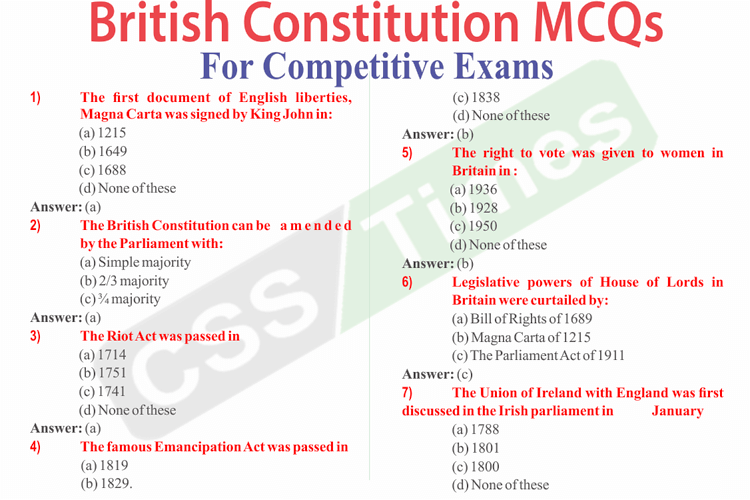1) The first document of English liberties, Magna Carta was signed by King John in:
(a) 1215
(b) 1649
(c) 1688
(d) None of these
Answer: (a)
2) The British Constitution can be amended by the Parliament with:
(a) Simple majority
(b) 2/3 majority
(c) ¾ majority
Answer: (a)
3) The Riot Act was passed in
(a) 1714
(b) 1751
(c) 1741
(d) None of these
Answer: (a)
4) The famous Emancipation Act was passed in
(a) 1819
(b) 1829.
(c) 1838
(d) None of these
Answer: (b)
5) The right to vote was given to women in Britain in :
(a) 1936
(b) 1928
(c) 1950
(d) None of these
Answer: (b)
6) Legislative powers of House of Lords in Britain were curtailed by:
(a) Bill of Rights of 1689
(b) Magna Carta of 1215
(c) The Parliament Act of 1911
Answer: (c)
7) The Union of Ireland with England was first discussed in the Irish parliament in January
(a) 1788
(b) 1801
(c) 1800
(d) None of these
Answer: (c)
8) Bill of Rights was passed in
(a) 1689
(b) 1693
(c) 1967
(d) None of these
Answer: (a)
9) The Test Act and Corporation Act were repeated in:
(a) 1826
(b) 1828
(c) 1830
(d) None of these
Answer: (d)
10) British House of Lords as Highest Court of Appeal Consists of:
(a) 12 members
(b) 16 members
(c) 9 members
(d) None of these
Answer: (d)
11) The Secret Ballot Act was passed during the premiership of:
(a) William Ewart Gladstone
(b) Disraeli
(c) Henry, 3rd Viscount Palmerstone
(d) None of these
Answer: (a)
12) The Parliament Act of 1911 was passed during the premiership of
(a) Henry, 3rd Viscount Palmerstone
(b) Herbert Henry Asquith
(c) Lloyd George
(d) None of these
Answer: (b)
13) The British constitution is based on:
(a) The theory of separation of powers
(b) Checks and balances
(c) Judicial review
(d) Difference between the theory and practice
Answer: (d)
14) Protection of property was passed in:
(a) 1865
(b) 1875
(c) 1885
(d) None of these
Answer: (b)
15) The word ‘REX’ stands for:
(a) The Queen
(b) The Crown
(c).The Court
(d).The Parliament
Answer: (b)
16) The Secret Ballot Act was introduced in England in:
(a) 1862
(b) 1867
(c) 1875
(d) None of these
Answer: (d)
17) The membership of Privy Council consist upon
(a) 300
(b) 200
(c) 100
(d) None of these
Answer: (d)
18) The Privy Council consists of _______ members:
(a) 30
(b) 100
(c) 330
(d) None
Answer: (d)
19) The Reform Bill of 1867 was called “a Conservative Surrender” by:
(a) Randolph Spencer-Churchill
(b) The third Marquess of Salisbury
(c) 1st Baron Ashbourne
(d) None of these
Answer: (b)
20) Act of Settlement was passed in:
(a) 1688
(b) 1697
(c) 1701
(d) None of these
Answer: (c)
21) The Riot Act was passed in
(a) 1705
(b) 1715
(c) 1719
(d) None of these
Answer: (b)
22) Navigation Acts were repealed in
(a) 1830
(b) 1842
(c) 1849
(d) None of these
Answer: (c)
23) The First Reform Act was passed in:
(a) 1822
(b) 1828
(c) 1832
(d) None of these
Answer: (c)
24) The book “Constitutional History of England” was written by:
(a) Adams
(b) Ramsay
(c) Muir
(d) None of these
Answer: (d)
25) Habeas Corpus Act was passed in:
(a) 1786
(b) 1794
(c) 1796
(d) None of these
Answer: (d)
26) The Septennial Act was passed in:
(a) 1702
(b) 1715
(c) 1716
(d) None of These
Answer: (b)
27) ’Social Contract’ was written by:
(a) Hobbes
(b) Lock
(c) Rousseau
(d) None of These
Answer: (c)
28) The University Test Act was passed in:
(a) 1870
(b) 1871
(c) 1872
(d) None of these
Answer: (b)
29) The cabinet system in England was adopted by:
(a) Queen Elizabeth
(b). Henry IV
(c) Charles II
(d) None of these
Answer: (c)
30) Slavery was abolished throughout the British Empire in:
(a) 1823
(b) 1833
(c) 1843
(d) None of these
Answer: (b)
Check our other MCQs collection below:
- General LAW MCQs (The Pakistan Penal Code 1860) Set-II
- World Geography MCQs (Set-I)
- Daily Top-20 MCQs for CSS, PMS, PCS, FPSC (Set-23)
- Daily Top-20 MCQs for CSS, PMS, PCS, FPSC (Set-22)
- Intelligence Test No. 1 (for all kind of Competitive Exams)
- Daily Top-20 MCQs for CSS, PMS, PCS, FPSC (Set-21)
- Introduction to Public Administration MCQs for CSS/PMS/PCS (SET-II)
- History of Indo-Pak MCQs (History of Subcontinent before Islam)
- Anthropology MCQs (Psychological Anthropology)
- Daily Top-20 MCQs for CSS, PMS, PCS, FPSC (Set-20)
